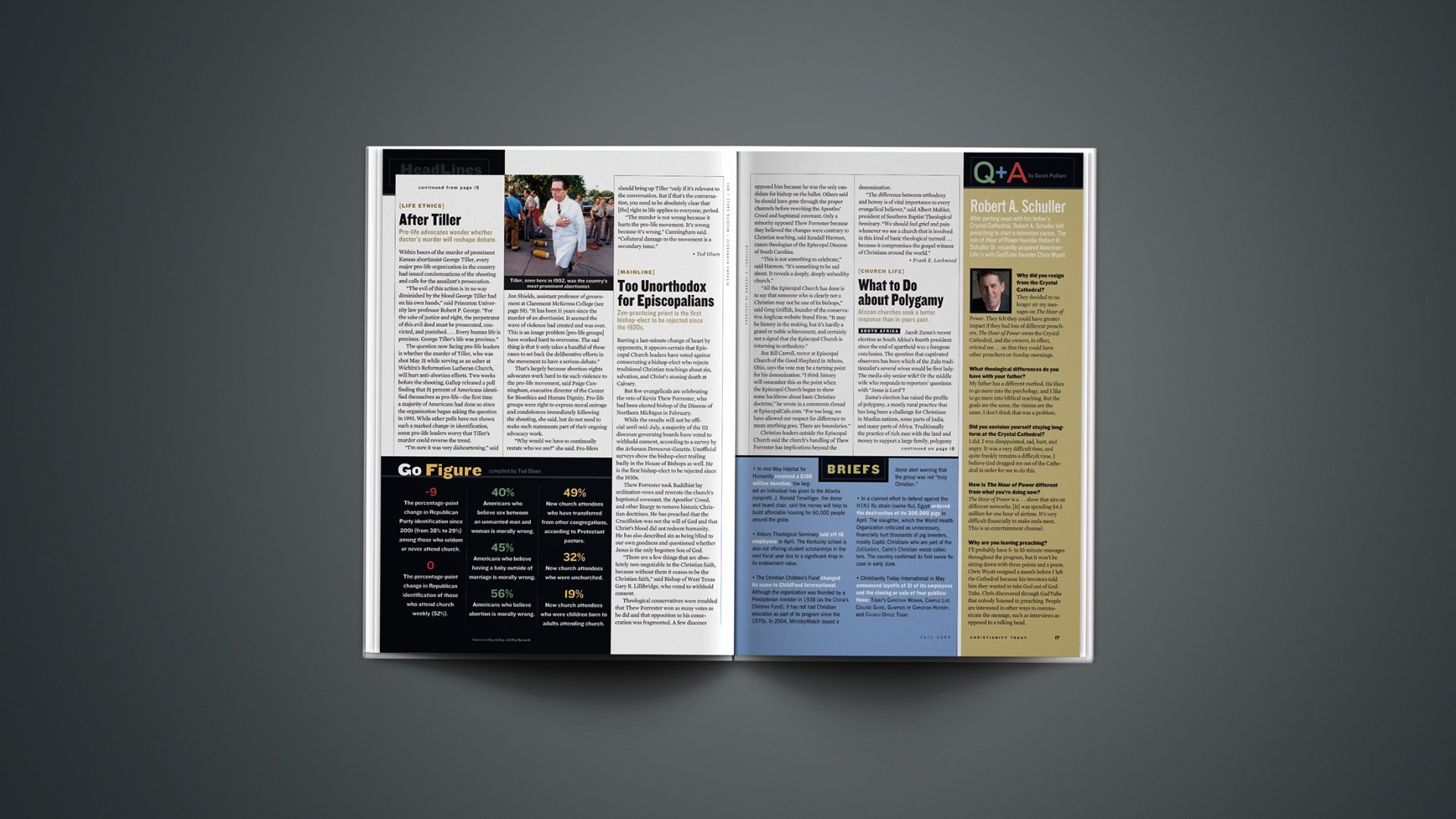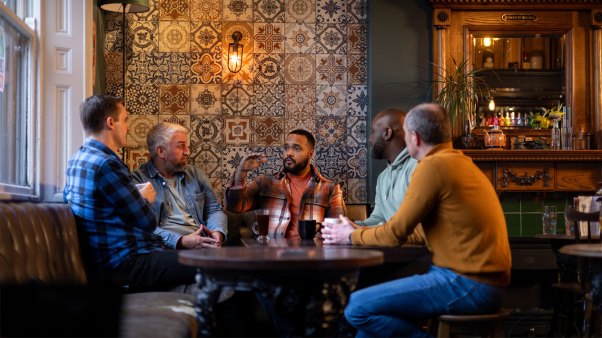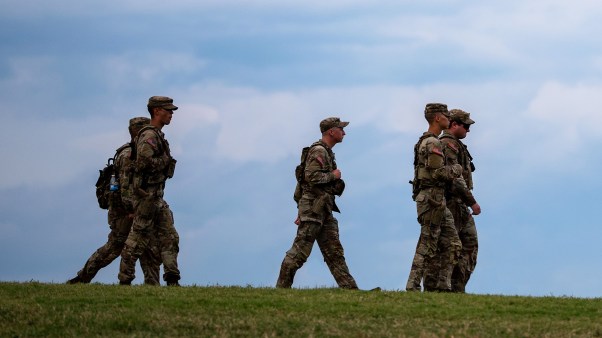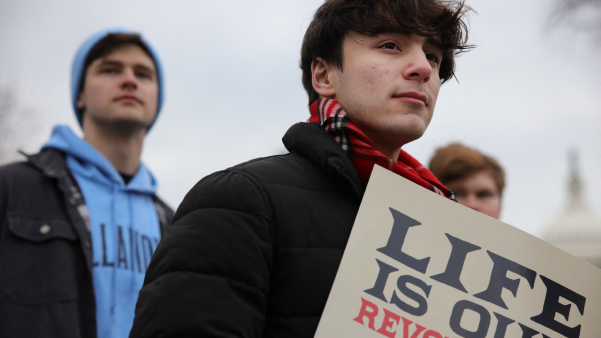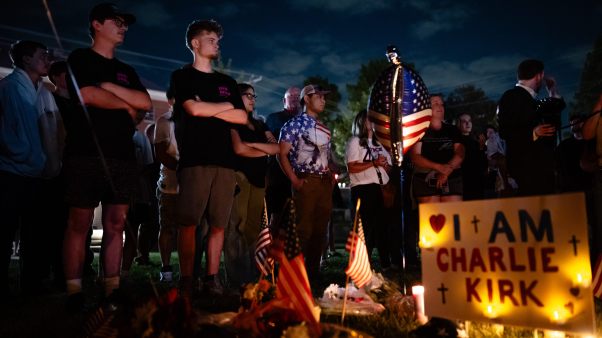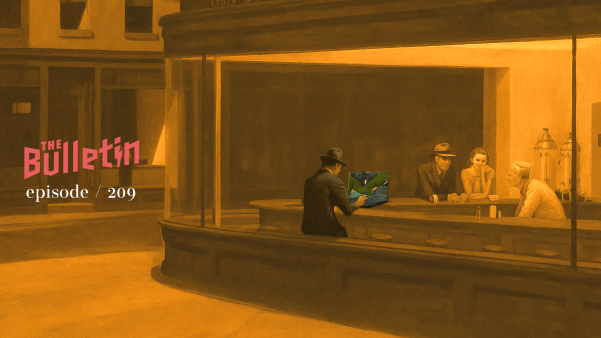Jacob Zuma‘s recent election as South Africa’s fourth president since the end of apartheid was a foregone conclusion. The question that captivatedobservers has been which of the Zulu traditionalist’s several wives would be first lady: The media-shy senior wife? Or the middle wife who responds to reporters’ questions with “Jesus is Lord”?
Zuma’s election has raised the profile of polygamy, a mostly rural practice that has long been a challenge for Christians in Muslim nations, some parts of India, and many parts of Africa. Traditionally the practice of rich men with the land and money to support a large family, polygamy is now practiced by middle-class and poor men, said Isabel Phiri, a theology professor at the University of KwaZulu-Natal in South Africa.
Experts say the African church isn’t united on what should be required when polygamists convert.
“African-initiated types of churches will be more welcoming, and you’d probably find a number of [polygamous families] in their churches,” said James O. Kombo, a senior lecturer at Daystar University in Kenya. “The mission-founded types of churches will tend to have none of that.”
Earlier Western missionaries felt a need to confront polygamy at the point of conversion. During colonial days in mission churches, Christians in good standing would give up the status symbol and send away all but one wife, said Kombo. Such a painful decision often meant that men would choose family or social standing over church. Medical missionary David Livingstone’s single convert abandoned the faith to return to polygamy.
Many African church leaders regret zero-tolerance policies for polygamous families of converts, saying that treating those marriages as invalid raises a number of problems. Besides absolving fathers of their responsibilities and leaving many economically dependent women out in the cold, it’s theologically questionable to force new converts to divorce, said Sunday Agang, an ethics professor at Jos ecwa Theological Seminary in Nigeria and a John Stott Ministries scholar.
None of the polygamists in the Old Testament were condemned specifically for having more than one wife, said Agang. “[But] God said in Malachi, ‘I hate divorce.’ So which one should we go for?”
Phiri tells the story of a Malawian who left his second wife and children in order to be baptized, and whose church forbade him to directly contact or aid his family after their homeland was struck by famine. “This is an example where missionaries with good intentions did not have a proper solution to the issue of polygamy,” said Phiri. “They’re promoting divorce without responsibility for the children. That doesn’t even sound biblical.”
Many African churches take a position that John Azumah, director of the Centre of Islamic Studies at the London School of Theology, calls ambiguous. If a polygamous man from a non-Christian background converts, his family is fully accepted into the church, yet such men are often not allowed to take Communion, hold a leadership position, teach, or sing in the choir—though they can participate in the offering.
These measures offer a problematic shortcut for church discipline, said Azumah. “If we deny people Holy Communion on the basis of sin, it should not only be for the polygamous. To deny someone a means of grace as a form of church discipline—I don’t see how helpful that is. … Lines should be drawn to be used as corrective lines for pastoral care to turn people around, rather than to turn people out of the church.”
Agang said churches should not insist that new converts immediately send away their wives. “We should allow them to grow to know the Lord,” he said. “We shouldn’t make it a condition for their salvation, or we confuse the message of the gospel.”
Kombo agreed. “Confess and begin your walk from where you are,” he said. “You accepted Christ in that status. Remain in that status and be faithful to God. That would be faithful to the African situation.”
Lessons for same-sex marriages?
U.S. churches may soon feel similar pressures: Eleven states now offer legal recognition to same-sex couples, and 12 allow them to adopt. Congregations will be confronted—if they haven’t been already—with new kinds of non-traditional families who want to be part of the church.
Despite the similarities, such as marital vows, legal status as a couple, and sometimes children through the marriage, few African Christians are likely to see parallels between gay marriage and polygamy. This is partly based on Scripture and partly on culture.
Kombo said gay marriage and polygamy are not moral equivalents in Scripture. “They are similar in the sense that you could say they are against biblical norms and practice. But they are not breaking the same rules. I don’t think that the same [response] should necessarily apply.”
Homosexual relations are specifically condemned in Leviticus and the New Testament. But Mosaic Law seems to set regulations for polygamy among the Israelites without condemning it. Nor did God condemn polygamous men, said Phiri. “In the Old Testament there is polygamy, even [among] those people who were known as men of God,” such as Jacob, David, and Gideon.
So, while many Christians believe church leaders must have only one wife (according to 1 Timothy and Titus), they tolerate polygamy on some level among congregants.
Homosexual activity, on the other hand, is illegal in 38 African nations, according to the BBC. In some areas, it is punishable by death or imprisonment. Most Africans “look at gay marriage as something that is completely off,” said Phiri.
The comparison also doesn’t resonate in that many African cultures hold children and family up very high. Agang said any infertile match, whether homosexual or to a barren woman, will be seen as “against the social structure and the community, because they will not have children.”
Azumah said, “I … make the case that apart from everything else, God created us for procreation. How [does] a gay couple fulfill that?”
The uniting factor, African theologians say, is the need for a pastoral response to the families. “The church is the place for them,” Azumah said. “There is no other place for them to go to. When we receive them into the church, just like anybody else, we should be prepared to use the gospel as a point of healing. Therefore we should be able to speak to the issues as we discern from the Spirit and read from Scriptures.”
Azumah is the child of a polygamous Muslim family. He said when Christians ask him, “Is your mother going to go to hell?” it’s not easy for him to answer. In the same way, he said, “I tell my people in Africa, ‘We sit in Africa and can be very condemnatory about gay people because we don’t have relations who are openly gay. If we did, it would make our theology more complicated.'”
He said the church needs to be “considerate not only [of] the gay people but their relations who might be in church and deeply care for their Christian faith—just as they care for their [homosexual family members].”
Dealing with same-sex couples in the church will require Western church leaders to sit down and discuss a united response, said Azumah and Kombo.
“The bottom line is, whatever the church needs to do, be it in discipline or theology, the church should not lose the human face,” said Azumah. “There’s always flesh attached to the Word. Jesus was full of grace and truth. When we’re dealing with gay people or polygamists, our church should be undergirded and guided by grace and truth.”
Copyright © 2009 Christianity Today. Click for reprint information.
Related Elsewhere:
See Christianity Today‘s earlier op-ed by John Witte Jr,, “Can America Still Bar Polygamy?“
News coverage, editorials, and op-ed pieces on same-sex marriage are available in our special section.
More coverage of Africa and African countries is available on our site as well.

